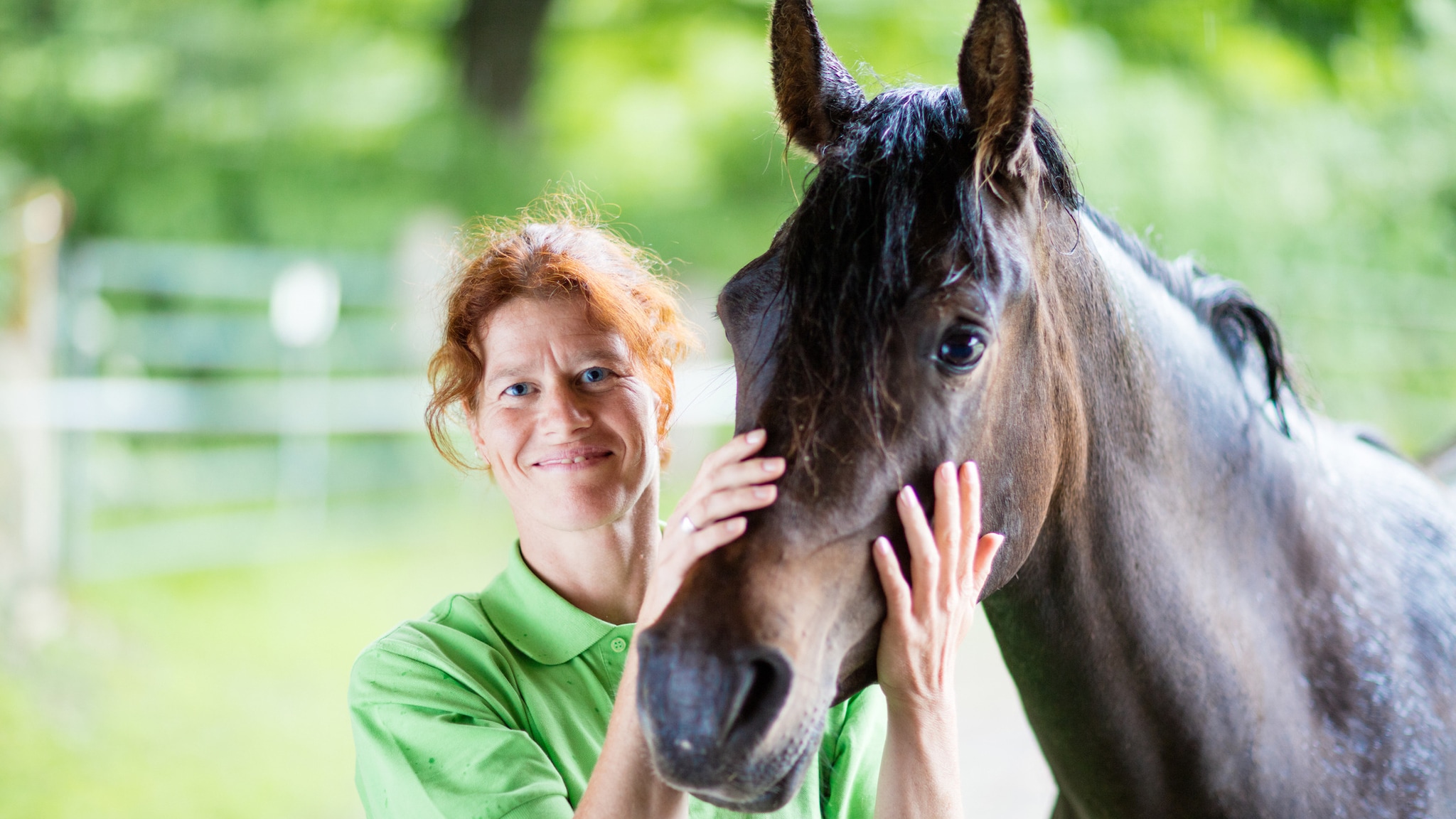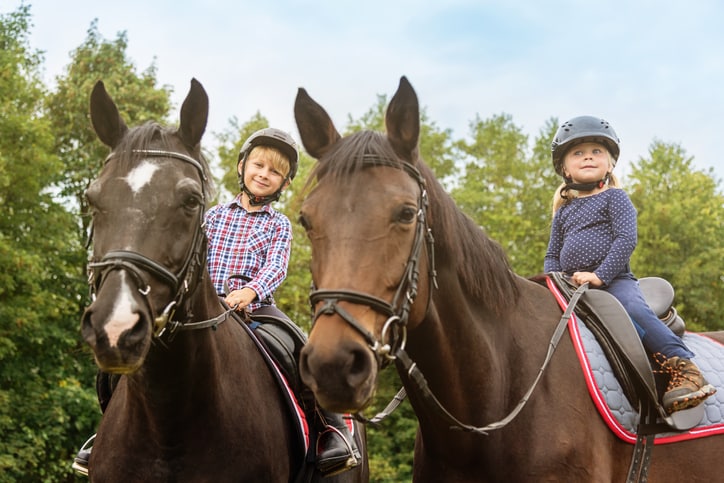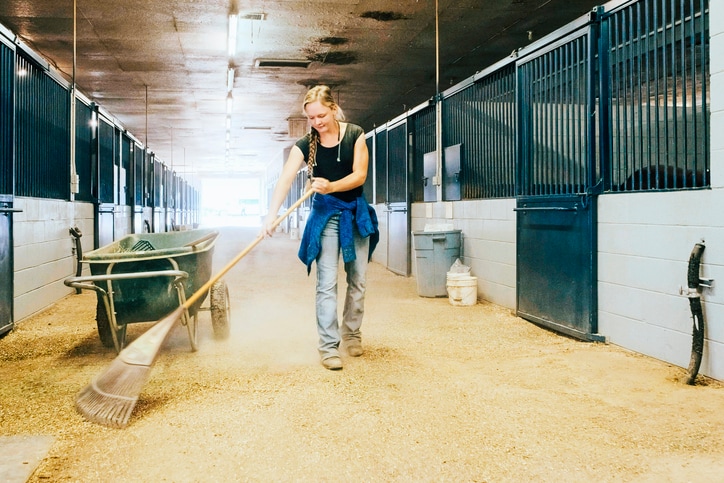What to know
- People who work with or own horses should be aware that horses can sometimes carry germs that can make people sick.
- Wash your hands after working with horses or touching their food or items in their environment.
- Ensure horses receive routine veterinary care to keep them healthy and prevent the spread of disease.

Overview
From pulling a plow over a farmer's field to carrying a cowboy across the open range, horses have always had an important role in society. Today, horses are generally considered companion animals, with close to 2 million U.S. households reporting horse ownership.
Riding and working around horses have been shown to increase balance, self-confidence, and self-esteem. However, as with any animal, people who work with or own horses should be aware that sometimes horses can carry harmful germs that can cause a variety of illnesses in people, ranging from minor skin infections to serious illnesses. Besides touching a horse, common chores such as cleaning stalls and grooming might put you at risk. One of the best ways you can protect yourself from getting sick is to thoroughly wash your hands after handling, cleaning up after, or feeding horses.
Diseases
Below are diseases that can be spread by horses.
- Anaplasmosis
- Anthrax
- Brucellosis
- Cryptosporidiosis
- Dermatophilosis (Lumpy wool, Strawberry foot rot, rainscald, rainrot)
- Eastern equine encephalitis
- Leptospirosis
- Lyme disease
- MRSA
- Rabies
- Ringworm
- Salmonella infection
- Tularemia
- Vesicular stomatitis
- Western equine encephalitis
- West Nile virus
How to stay healthy around horses

Before you interact with horses, be aware that they can sometimes carry germs that can make people sick, even when they appear healthy and clean. Always get routine veterinary care for your horse to keep it healthy and to prevent infectious diseases.
Wash your hands
- Wash your hands thoroughly with soap and running water:
- After contact with horses or their equipment
- After doing chores such as cleaning stalls, brushing your horse, or cleaning equipment
- After riding your horse or touching horse poop, urine, saliva, or blood
- Before you eat or drink
- After contact with horses or their equipment
- Adults should supervise hand washing for children under 5 years old.
Use hand sanitizer if soap and water are not readily available. Be sure to have hand sanitizer readily available near the horse's stall to encourage others to use it before handling the horse or its equipment.
Prevent horse bites and kicks
Kicks and bites from horses can cause serious injury and sometimes illness. Bites and kicks can spread germs, even if the wound does not seem deep or serious.
- Be aware of your surroundings and know where the horse is at all times.
- Be cautious when approaching a horse.
- Approach a horse's head from the side where they can see you better—not from the front.
- Watch their ears—if the ears are flattened, the horse might bite.
- Don't stand directly behind a horse.
- Don't approach a horse from its rear end.
- Don't leave young children unsupervised around horses.
What to do if you are bitten or injured by a horse
If you are injured by a horse, you should:
- Wash wounds with warm, soapy water immediately.
- Seek medical attention if:
- You don't know the vaccination status of the horse.
- The horse might have been exposed to a rabid animal. Make sure a veterinarian checks the horse if it becomes sick or dies within 6 months of a bite from another animal.
- The horse appears sick or is acting unusual.
- The wound or injury is serious (uncontrolled bleeding, unable to move, extreme pain, muscle or bone is showing, or the bite is over a joint).
- The wound or site of injury becomes red, painful, warm, or swollen (especially if the person bitten is 5 years of age or younger, 65 years of age or older, a pregnant woman, or has a weakened immune system.)
- Your or your child's last tetanus shot was more than 5 years ago.
- You don't know the vaccination status of the horse.
How to keep horses healthy

Before choosing a horse
- Learn about the different types of horses and temperaments before you bring one home.
- Find out what types of horses are suitable for your family. Some horses, such as young or untrained horses, might not be suitable for young children or people with very little riding experience.
- Research how to properly care for your horse. Ask a veterinarian about the proper food, care, and stall or pasture environment for the horse you are selecting.
- Be aware of the potential for your horse to spread germs to people and other animals.
How to choose a horse
- Match the horse's attitude, temperament, size, and training or activity level with:
- Your family's time and ability to train and care for them
- The purpose for which you are buying the horse (for example, showing, trail riding, teaching)
- Your family's time and ability to train and care for them
- Consider having the horse thoroughly examined by a veterinarian before purchase to make sure the animal is healthy and is not carrying diseases that could pass to people.
- If you are bringing the horse into a herd setting, you might need to keep the horse separate for a short time to prevent any diseases from spreading to your other horses.
- Some general guidelines for choosing to separate a newly purchased horse are if:
- It has an unknown medical history
- It is coming from an unknown source, sale barn, or horse show where it has been in contact with unknown horses
- It traveled a long distance and is stressed or showing signs of disease, such as a cough, runny nose, swollen lymph nodes, fever or diarrhea
- It has an unknown medical history
- For more information on separating newly acquired horses, contact a veterinarian.
How to house your horse
- House horses in a stall, out on pasture, or in a combination of both. If they are out on pasture, they should have some kind of shelter in case of bad weather.
- Make sure your horse always has access to clean water, whether in a stall or out in a pasture.
- Clean horse stalls daily to prevent build-up of feces (poop) that could spread disease to your horse or to you and your family.
- Dispose of poop, soiled bedding, and uneaten food properly.
Monitor your horse's health
- Have your veterinarian visit your horse's stall often to care for and check your horse's health.
- Talk to your veterinarian about vaccinations for rabies, West Nile, and other viruses causing equine encephalitis.
- If possible, keep horses in an enclosed area at night to decrease their exposure to wild animals that could be carrying rabies and other diseases.
- Use feeders that are above the ground to keep wild animals away from your horse and your horse's food.
Resources
Selecting and caring for a horse
- Selecting a Horse (American Veterinary Medical Association)
- Bringing Horses into the United States
- Get-A-DVM (American Association of Equine Practitioners)
